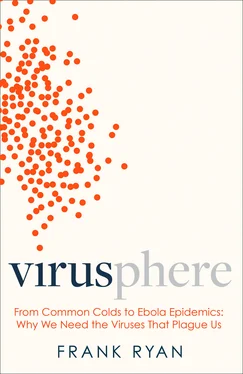It is hardly surprising that we should fear them and consider them an epitome of menace, perhaps even evil. But contrary to what we might think about viruses, they are not driven by malice. Their ultimate goal, just like that of all living organisms, is simply to survive and multiply, thereby ensuring the success of their kind. That’s all very nice to know but this lack of malice is hardly a comfort to us when we are infected by a virus. It is only natural in such circumstances that we might resent viruses and what they might do to us. It is equally natural that we should also feel the need to protect those we love from viruses while knowing that, if and when one of them comes along, it will arrive among us, unseen and unknowable, causing damage and pain among us, even to the most innocent, without feeling or rational explanation.
We are comforted by the knowledge that there are vaccinations available to protect us and our families from these viruses. But that same misinformation about various different vaccination campaigns has sown confusion among us. Meanwhile, there appears to be little to nothing that we can do about certain epidemic varieties, such as the norovirus or the common cold, which sweep through our populations as common experiences, albeit experiences we would rather avoid, provoking altogether negative associations in relation to viruses. Is it any surprise that we are inclined to wonder what other capacity for mischief viruses are capable of? You might well take the question further and wonder aloud: what is the purpose of these minuscule entities? Wouldn’t our world be a good deal better off if these dratted parasites were simply eliminated from the scene, never to bother us any more?
The curious thing is that, while as a doctor I sympathise with such sentiments, I cannot entirely agree with them. Counter-intuitive as it might seem, I know that a world without viruses would not be one in which I would care to live. Why do I suggest such a thing? It introduces what might appear to be a contradictory question. Does the existence of viruses really matter to you and to me? I can assure my readers that, contrary to what our primal instincts might suggest, the answer is, strangely, but indubitably, yes!
In his elegant essay ‘The Lives of a Cell’, the late Lewis Thomas drew attention to the fact that we humans are not above the rest of life. In his words, ‘Man is embedded in nature.’ While accepting the fundamental truth in this, I would further extrapolate from it the fact that nature is embedded in humankind. And the nature I am referring to includes viruses. I don’t, however, expect you, my readers, to simply take my word on this. But even the possibility that we humans owe our existence to, and remain dependent on, the very existence of viruses is more than enough to suggest we take the trouble to understand them.
That is what I hope to achieve in writing this book. It is my intention to enable you, my readers, to understand viruses.
In fact, even at a self-interest level, it is only natural that we should feel the need to understand entities that are capable of seriously hurting us. We surely need to know how they might threaten us and our loved ones and what we can possibly do to mitigate this threat. I freely confess that this was my perspective when, as a youthful medical student, I performed my first experiments on viruses long ago. Years later it remained my perspective when, as a busy hospital physician dealing with serious medical emergencies, it was my duty to diagnose and treat many patients suffering from viral infections. But then, during a period of international travel aimed at examining what was actually happening when new ‘emerging viruses’ were threatening entire populations, I discovered that my former perspective was somewhat blinkered in relation to viruses. Here I invite my readers to remove those same blinkers and look beyond the undoubted mischief of viruses to find answers to their behaviour and presence among us.
Key to such understanding is to get to know their strange and extraordinary world. Thanks to the most modern advances in the science of virology, we are now in a better position than ever before to understand that world. We are about to explore what, in scientific circles, is now called ‘the virosphere’, a play on which forms the title of this book.
How could such an exploration be anything other than an odyssey? Viruses circumambulate our world with the speed of a passenger jet, paying no heed to national boundaries, or circumscribing notions of nationality, ethnicity, race or religion. They pay no heed to sex or age, or social class, or indeed any human hubris of fame, celebrity, wealth or power. They are devoid of any sense of justice or morality, so that our social or religiously derived morals prompting concepts of goodness, badness, justice, sin, simply do not apply. Now add to this situation the fact that these threatening entities are, for the most part, utterly invisible, even under the most powerful magnification of the light microscope, making them all the more enigmatic – and perhaps also the more scary. These invisible entities invade not just our tissues and organs, but, to borrow the metaphor from Anthony Hopkins, they step inside the chalk circles of our most intimate and innermost being: the nucleus of our living cells, the repository of our coding DNA.
It is not a bad thing that we should be wary of viruses, but in this exploration we need to rise above mere scare stories. The fact is that the vast majority of viruses in this world – and there really are very many of them – have no mischievous interest in humans. This rather begs a new question: if such viruses are not interested in you and me, what are they interested in?
My purpose in writing this book is to explain what viruses really are, to accurately define them, and from such an understanding to explore their role in our human history and the wider history of our world. I hope to do so in a way that readers, whether they come from a scientific background or have no prior knowledge of viruses, will understand the true importance of viruses to life and to the biosphere. Given such potential importance, how can we possibly get to grips with such minuscule entities? How can we even hope to visualise their quintessentially viral way of life in their complex ultramicroscopic world? As with historic explorations of alien worlds, it might help our exploration if we could avail ourselves of some guide.
I would suggest that there is an obvious guide, one that is entirely apposite, whose perspective has only recently been opened up to us in wonderful detail through the deepest penetration of the living world by the enlightenment of modern scientific techniques. In this new age of ultramicroscopic exploration, we shall be getting up close and personal to the viruses themselves. As we shall discover, viruses really are far more embedded in us, and in the biological and ecological world that we inhabit, than most ordinary folk might possibly imagine.
I Contents Cover Title Page Copyright Dedication Epigraph Introduction 1. What Are Viruses? 2. Coughs and Sneezes Spread Diseases 3. A Plague Upon a Plague 4. Every Parent’s Nightmare 5. A Bug Versus a Virus 6. A Coincidental Paralysis 7. Deadly Viruses 8. An All-American Plague 9. Lurker Viruses 10. How Flu Viruses Reinvent Themselves 11. A Lesson from a Machiavellian Virus 12. The Mystery of Ebola 13. The Mercurial Nature of the Zika Virus 14. A Taste for the Liver 15. Warts and All 16. Lilliputian Giants 17. Are Viruses Alive? 18. Inspiring Terror – and Delight 19. The Ecology of the Oceans 20. The Virosphere 21. The Origins of the Placental Mammals 22. Viruses in the Origins of Life 23. The Fourth Domain? Bibliography and References Index About the Book About the Author Also by Frank Ryan About the Publisher
Читать дальше




![Ally Carter - [Gallagher Girls 01] I'd Tell You I Love You But Then I'd Have to Kill You](/books/262179/ally-carter-gallagher-girls-01-i-d-tell-you-i-lo-thumb.webp)







